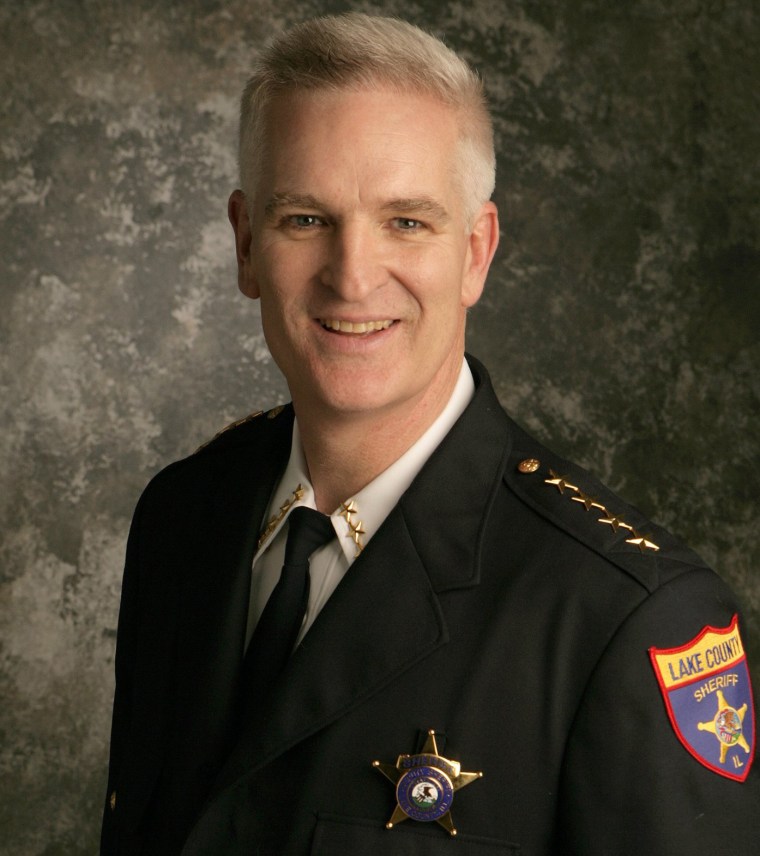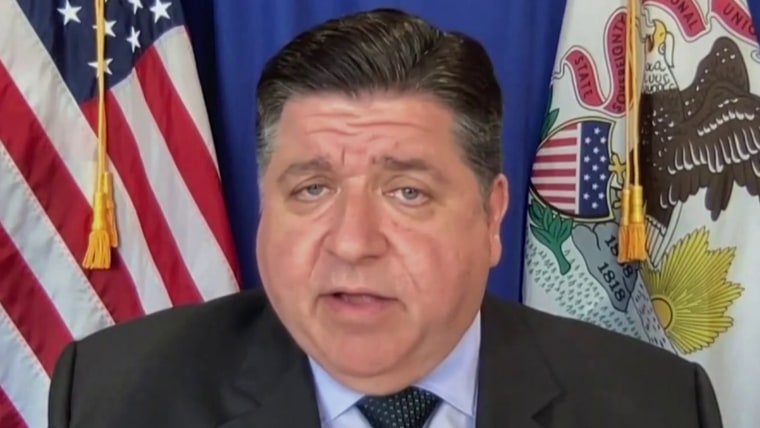Abortion in Illinois imperilled if GOP takes control of the state Supreme Court in November
CHICAGO — Illinois lawmakers took steps to make abortion rights untouchable before Roe v. Wade was overturned, but an upcoming judicial election could undermine those safeguards.
Two seats on the Illinois Supreme Court are up for grabs this November in the second and third judicial districts, both of which surround Chicago.
Right now, Democrats hold a slim 4-3 majority on the court. But if the Republican judicial candidates win in the two suburban districts that only lean Democratic, the GOP will take control of the court for the first time in decades.
And that could spell trouble for the legions of Midwesterners now flocking to Illinois for abortions from neighboring states where the procedure has been banned, advocates say.
Judicial elections don’t often grab the same national attention as other political races in which voter turnout is often much higher, but observers say the Supreme Court races in Illinois could foreshadow similar battles in other states over reproductive rights with sweeping consequences.
“If we lose this election, there is absolutely no guarantee that abortion will be legal past 2023,” said Terry Cosgrove, president and CEO of Personal PAC, an abortion rights advocacy group.
Anti-abortion efforts remain active
Five years ago, Illinois lawmakers approved HB 40, which is a legislative safety lock that was placed on a trigger law that was passed in 1975 when the state wasn’t a Democratic stronghold — and which was designed to criminalize abortion if the U.S. Supreme Court overturned Roe.
Peter Breen of the conservative legal organization Thomas More Society sued to overturn HB 40 after Gov. Bruce Rauner, a Republican, signed it into law in 2017, but the Illinois Supreme Court decided not to take the case.
“At this point, there’s no contemplated or actual challenge to Illinois’ abortion laws coming from the pro-life side,” Breen said.
Instead, said Breen, “we’re redoubling our traditional efforts of protecting First Amendment rights.”
“We’ll have more abortion clinics, so we’re going to have more ‘sidewalk counseling’ and we’ll have more issues of states coming after pro-life pregnancy centers,” he said.
Sidewalk counseling refers to having abortion opponents stand outside clinics and try to persuade women from going inside. The practice has been likened to harassment and has, at times, grown violent.
Still, Illinois anti-abortion groups are keen on electing judges they view as sympathetic.

Justice Michael Burke, a Republican representing the state Supreme Court’s second district who is running for a 10-year term in the third district after district maps were redrawn, as well as former Lake County Sheriff Mark Curran, who declared victory Friday over three other GOP candidates vying to be the justice in the second district, were “found qualified” by Illinois Right to Life Action in its latest voter guide. None of their Democratic rivals made the group’s cut.
Hundreds of abortion opponents are expected to gather Saturday in downtown Chicago to celebrate the overturning of Roe and also send a message to the Illinois Supreme Court, said Kevin Grillot, director of March for Life Chicago.
“One of the first steps we are taking is to inform the public of how important it is who sits on the Supreme Court of each state,” Grillot said. “One of the things the Supreme Court ruling did was return the decision about protecting preborn lives to the states. So now our votes matter.”
Ed Yohnka, spokesman for the ACLU of Illinois, agreed that “anti-abortion forces are not resting.”
“It is accurate that the Illinois State Supreme Court indeed did reject efforts by anti-abortion advocates in Illinois to strike down measures adopted by a majority of both chambers and signed into law by the duly elected governor of our state,” Yohnka said.
“A change in personnel on the state Supreme Court could change the outcome of such challenges — as we recently witnessed in the Supreme Court of the United States,” he said.
Brigid Leahy, the vice president of public policy for Planned Parenthood Illinois Action, said the overturning of Roe was a wake-up call that states can no longer count on the Supreme Court — and a half-century of legal precedent — to protect reproductive rights.
So that makes the Illinois judicial elections a “priority” for abortion rights advocates this year.
“It is key that the body maintains a majority that understands we have fundamental reproductive rights in Illinois, and Planned Parenthood is going to fight like hell to make sure those rights are protected,” said Leahy.
Joe Power, a veteran Illinois attorney, agreed and said the Trial Lawyers Association will likely ramp up its funding in the race this fall to oppose the election of the Republican judicial candidates in these two districts.
“You could take the map from the Midwest and all the pro-life states that surround Illinois and if these two are elected — both of them are pro-life — we may not have anything in the entire Midwest that respects a woman’s right to choose,” Power said.
Meghan Leonard, an associate professor of politics and government at Illinois State University and an expert on her state’s Supreme Court, said: “Anybody who wants to change the law is up against the hardest battle in all of the states.”
But it can be done if somebody sues and the state Supreme Court decides to take the case, said Leonard.
“I don’t think anything will get there anytime soon, and it would depend on the makeup of the court at the time,” said Leonard.
Two districts could swing the court
The second district now consists of five counties north and west of Chicago, and the third is made up of seven counties west and south of Chicago.
These districts had been trending Republican until they were recently redrawn for the first time since 1964 and shrunken to exclude more rural parts of the state, said Kent Redfield, professor emeritus of political science at the University of Illinois Springfield.
These are now “swing districts that lean Democratic,” Redfield said.
Burke was appointed justice in the second district last year to succeed retiring Justice Robert Thomas, who used to be a kicker for the Chicago Bears.
A respected jurist, Burke is now running in the third district because the new map moved DuPage County, where he lives, out of the second district. He faces Democrat Appellate Court Judge Mary O’Brien in November.
When asked about HB 40, Burke told NBC News via email that he chooses “not to answer questions which may be interpreted as committing myself to a certain position on issues that may come before the court.”
“It is within the province of the Illinois General Assembly to pass the laws that govern this state,” he added. “Whatever personal views I have on issues do not give me the authority to legislate from the bench.”
Burke’s departure left his seat in the second district open, and Curran appears to be clinging to a slim lead in the polls in a crowded GOP field.
Curran, whose apparent victory is expected to be finalized on Tuesday, will take on the Democratic nominee, state circuit court Judge Elizabeth Rochford.
Asked for his position on HB 40, Curran replied in an email, “We cannot state how we would rule on anything. Certainly not pending legislation that may come before the court.“
But Curran made no secret of the fact that he opposes abortion during his failed bid in 2020 to unseat Sen. Dick Durbin, a Democrat. He was backed by former President Donald Trump, although he differs with him on issues like immigration.
Curran was also harshly criticized for saying, just days after the death of Rep. John Lewis, the Georgia Democrat, that the civil rights icon was “in bed with Planned Parenthood and the abortion industry.”
While Curran did not directly address the issue of abortion in a recent interview with the Lake County News-Sun, he appeared to be taking the Trumpist line on other culture war issues.
“The court must uphold liberty and freedom,” Curran told the News-Sun. “A judicial style like this works for everyone. These are the bookends of a decision and the backdrop of the Constitution. A man claiming to be a woman and competing in sports is not natural law.”
Activists remain vigilant
That kind of talk alarms community activists like Anna Zolkowski Sobor, who works on Chicago’s Northwest Side and has been talking to her suburban friends about the need to vote in the upcoming state Supreme Court elections.
“I think in Illinois we have a false sense of security that because we are a deeply blue state with a Democratic governor and a majority Democratic Legislature that reproductive rights are safe,” Sobor said. “They are not.”
Sobor said the election of Burke and Curran to the state’s highest court would be the culmination of a long-standing effort by anti-abortion forces to pack local library and school boards and courts with people “whose fringe beliefs are not shared by most people in Illinois.”
Currently, Planned Parenthood operates 18 health centers across the state that has become a haven for abortion access in the Midwest.
Illinois health data shows that abortions for in-state residents fell more than 6%, from 38,622 in 2010 to 36,174 in 2020. But the figure for out-of-state residents coming to Illinois for abortions almost tripled in that same period, from 3,050 to 9,686.
Democratic Gov. J.B. Pritzker has already made it clear that he is running for re-election on the promise to protect abortion rights in Illinois.
“Here in Illinois, we’re an island surrounded by anti-choice laws and anti-choice states, legislatures and governors,” Pritzker said in a recent interview with NBC News. “We’re going to make it possible in the state, if they come to Illinois, that they will be able to get a procedure.”
Natasha Korecki reported from Chicago, and Erik Ortiz and Corky Siemaszko reported from New York.



